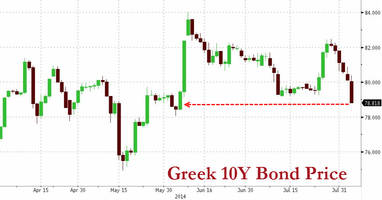 *Greek 10Y yields, up 6 days in a row, have surged in the last few days to 2-month highs* (bond price lows). The significant shift in sentiment appears related to two main factors. First, The Independent reports that *Europe is considering pulling Troika (its economic oversight committee) - which has been likened to German Nazi occupation - out of Greece*, forcing local politicians to come up with their own reforms by the start of 2015 (which clearly the market is not believing). Perhaps even more concerning is Goldman Sachs shift to neutral on European peripheral bonds, warning that "*at current spread levels we think there is not enough of a buffer for investors to take credit risk in intermediate and long-dated peripheral sovereign bonds*." Time for some more 'whatever it takes' we think.
*Greek 10Y yields, up 6 days in a row, have surged in the last few days to 2-month highs* (bond price lows). The significant shift in sentiment appears related to two main factors. First, The Independent reports that *Europe is considering pulling Troika (its economic oversight committee) - which has been likened to German Nazi occupation - out of Greece*, forcing local politicians to come up with their own reforms by the start of 2015 (which clearly the market is not believing). Perhaps even more concerning is Goldman Sachs shift to neutral on European peripheral bonds, warning that "*at current spread levels we think there is not enough of a buffer for investors to take credit risk in intermediate and long-dated peripheral sovereign bonds*." Time for some more 'whatever it takes' we think.Greek Bonds are tumbling...
As The Independent reports,
*Brussels is considering pulling the troika out of Greece* to allow Athens to pursue its own plan to improve the economy, European officials have told Reuters.
The move seems to be partly a *reaction to political pressure from Greek anti-troika political parties* set to do well in polls.
The discussion, still in its early stages, will gather pace as Greece and its euro zone backers chart a new course for the country with its second European bailout programme due to end later this year.
*Dismantling the troika, which has been likened by some in Greece to the German Nazi occupation*, would probably be central to the new plan for Athens, news agency Reuters added without saying where it learnt of the plan.
...
*Switching to a 'reform-for-debt-relief' scheme with lighter supervision could sooth public frustration and help bolster the coalition government at the expense of far-left political party Syriza*, which has promised to tear up Greece's international bailout agreement and is leading in the polls.
...
"There must be Greek ownership of reform. *The Greeks have until October to come up with a programme, which would be decided by December for the start of 2015*."
As a fall back, Greece could be given a precautionary credit line - like Portugal..., however...
*"It was a mistake not to give Portugal a precautionary credit line," the official said, referring to Lisbon's conclusion of its bailout without such back-up. "You couldn't make the same mistake with Greece."*
So more free money in case they screw up.
* * *
*Troika or no Troika, it seem beggars remain choosers in Europe - despite the hardships of the people.*
* * *
But investors may be less patient... (via Goldman Sachs)
*At current spread levels we think there is not enough of a buffer for investors to take credit risk in intermediate and long-dated peripheral sovereign bonds* and to position for further spread tightening. Given our strategic view on core bonds, we expect EMU peripheral yields to increase in coming months and the curves to steepen alongside the Bund curve.
Furthermore, *the market should begin to discriminate more across peripheral issuers *and country-specific factors are likely to play an increasing role in investment decisions, while, so far, the backstop provided by the central bank was all that mattered. Given the macro implications of higher yields for growth and debt sustainability, an increase in core rates is likely to have a *stronger effect in `weaker countries`*.
In this context, *we are more concerned about Italy where, over the past few months, economic activity data has continued to surprise on the downside and institutional and structural reforms have not yet been delivered*. In Q1, GDP growth was negative and the signal from high-frequency indicators for Q2 continues to be weak. The Italian government is struggling to pass changes to the electoral law and the Senate, and to implement liberalization reforms that can spur growth and attract foreign investors. The fiscal outlook is deteriorating, spending cuts and privatization plans are stalling. Until the country delivers on some of these dimensions and growth comes back, an increase in core yields is likely to lead investors to demand more compensation for holding BTPs as higher interest rates will carry a greater economic and credit risk.
*Finally on Portugal, we do not expect that 10-year spread to Bunds to compress further as we previously wrote. *There is now more clarity on the Banco Espirito Santo Group to guide our strategic views. The bail-in procedure announced on August 3 fits into the new template of achieving a separation between banks and sovereign`s liabilities and this is a positive for the outlook of Portuguese bonds. That said, the fact that the cash buffer available from the EU/IMF program to recapitalize banks is shrinking and evidence that, even after the Troika has been in the country for three years, there was a non-trivial governance problem in the second largest bank of the country that might leave some legacy in terms of institutional transparency and credibility.
* * *
So, the Greeks are on their own to manage their economy (that worked out well before) and investors are losing faith in Draghi's ability to hold rates down forever... at the same time as European growth expectations are collapsing... Reported by Zero Hedge 1 hour ago.